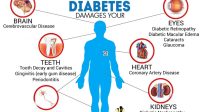The Digestive System: The Powerhouse of Processing
The digestive system is a marvel of engineering, responsible for breaking down food into its basic components, absorbing nutrients, and eliminating waste. This intricate process involves a series of organs, each with a specific function:
- Mouth: The journey begins with the mouth, where food is chewed and mechanically broken down. Saliva, containing enzymes, initiates the digestive process by breaking down carbohydrates.
- Esophagus: The chewed food then travels down the esophagus, a muscular tube, to the stomach.
- Stomach: In the stomach, food is churned and mixed with powerful digestive juices, further breaking down proteins and fats.
- Small Intestine: The small intestine is the primary site for nutrient absorption. Here, food is further digested by enzymes and bile from the liver and pancreas. The small intestine’s lining contains tiny villi that increase surface area, maximizing nutrient absorption into the bloodstream.
- Large Intestine: Undigested material moves to the large intestine, where water is absorbed, and waste products are formed. These wastes are then eliminated from the body through the rectum and anus.
Maintaining Digestive Health
A healthy digestive system translates to better energy levels, a stronger immune system, and a reduced risk of chronic diseases. Here are some key strategies to promote optimal digestive health:
- Fiber is your Friend: Fiber plays a crucial role in digestion by adding bulk to stool and promoting regularity. Include plenty of fruits, vegetables, and whole grains in your diet.
- Hydration is Key: Drinking sufficient water throughout the day is crucial for proper digestion and preventing constipation.
- Manage Stress: Chronic stress can disrupt digestive processes. Practice relaxation techniques like yoga or meditation to manage stress effectively.
- Mindful Eating: Eat slowly and savor your food. Chewing thoroughly helps break down food more efficiently, aiding digestion.
- Listen to Your Body: Pay attention to your body’s signals. Avoid processed foods, sugary drinks, and excessive caffeine, which can disrupt digestion.
- Consider Probiotics: Probiotics are live bacteria that can improve gut health and digestion. Consider incorporating probiotic-rich foods like yogurt or kefir into your diet, or discuss probiotic supplements with your doctor.
The Eyes: Windows to the World
Our eyes are the windows to the world, allowing us to experience the beauty and wonder around us. They are intricate organs with several key components:
- Cornea: The transparent outer layer of the eye that protects it and helps focus light.
- Iris: The colored part of the eye that controls the amount of light entering the pupil.
- Pupil: The black circular opening in the center of the iris that allows light to enter the eye.
- Lens: A transparent structure inside the eye that focuses light onto the retina.
- Retina: The light-sensitive layer at the back of the eye that converts light into electrical signals transmitted to the brain.
Protecting Your Eyesight
Maintaining good eye health is vital for preserving vision and preventing eye diseases like macular degeneration and cataracts. Here are some ways to safeguard your precious eyesight:
- Eat a Healthy Diet: Nutrients like lutein, zeaxanthin, vitamins A, C, and E, found in fruits, vegetables, and fish, play a vital role in eye health.
- Maintain a Healthy Weight: Obesity is a risk factor for several eye diseases, including diabetic retinopathy.
- Regular Eye Exams: Schedule regular eye exams with your ophthalmologist, especially if you experience any changes in vision. Early detection and treatment can prevent vision loss.
- Protect Your Eyes from UV Rays: Wear sunglasses that block both UVA and UVB rays to shield your eyes from sun damage, which can contribute to cataracts and macular degeneration.
- Limit Screen Time: Excessive screen time can strain your eyes. Take frequent breaks and practice the 20-20-20 rule: every 20 minutes, look at something 20 feet away for 20 seconds.
The Kidneys: Silent But Mighty Filters
The kidneys are two bean-shaped organs located on either side of the spine. They act as the body’s filtration system, performing several vital functions:
- Electrolyte Balance: Kidneys maintain a healthy balance of electrolytes, like sodium and potassium, which are crucial for various bodily functions like muscle contractions and nerve impulses.
- Blood Pressure Regulation: Kidneys help regulate blood pressure by controlling fluid levels in the body.
- Red Blood Cell Production: Kidneys produce erythropoietin, a hormone that stimulates the production of red blood cells in the bone marrow.
Supporting Kidney Health
Since kidneys play such a vital role in our overall health, it’s essential to take steps to support their function:
- Hydration is Key: Just like for digestion, proper hydration is crucial for kidney health. Drink plenty of water throughout the day to help the kidneys effectively remove waste products.
- Limit Salt Intake: Excessive sodium intake can put a strain on the kidneys. Opt for low-sodium alternatives and limit processed foods that are often high in sodium.
- Maintain a Healthy Weight: Being overweight or obese increases the risk of kidney disease. Aim for a healthy weight through a balanced diet and regular exercise.
- Manage Blood Pressure: High blood pressure can damage the kidneys. If you have high blood pressure, adhere to your doctor’s treatment plan to keep it under control.
- Monitor Blood Sugar: Diabetes is a leading cause of kidney disease. If you have diabetes, managing your blood sugar levels is crucial for protecting your kidneys.
- Avoid Smoking: Smoking reduces blood flow to the kidneys and increases the risk of kidney disease.
Conclusion: A Holistic Approach to Well-being
The digestive system, eyes, and kidneys are just three of the many vital organs that work together to keep us healthy. By incorporating the tips outlined above into your daily life, you can significantly improve the function of these organs and contribute to overall well-being. Remember, a healthy lifestyle encompassing a balanced diet, regular exercise, adequate sleep, and stress management is the cornerstone of maintaining optimal organ function and overall health.
Additionally, consider these points:
- Consult your Doctor: While these tips promote general wellness, consult your doctor for personalized advice and guidance. They can assess your individual risk factors and recommend specific strategies for maintaining optimal organ health.
- Early Detection is Key: Regular check-ups and screenings can help detect potential problems in their early stages, allowing for prompt intervention and better treatment outcomes.
- The Power of Prevention: Taking proactive steps to maintain your organ health is far more effective and easier than dealing with complications arising from neglect.
By prioritizing our well-being and taking care of these vital organs, we can lead healthier, more fulfilling lives, appreciating the incredible work our bodies do every single day.







